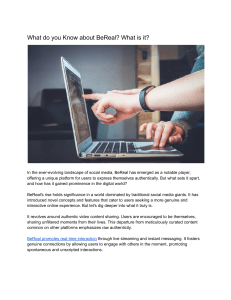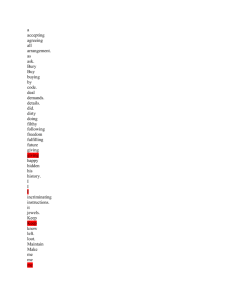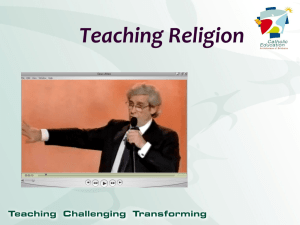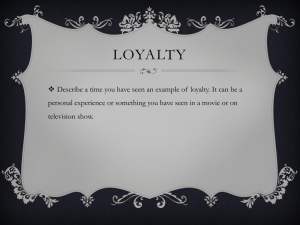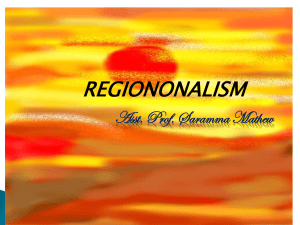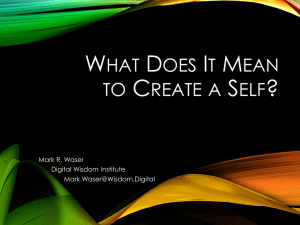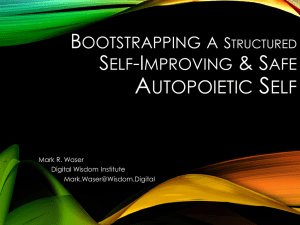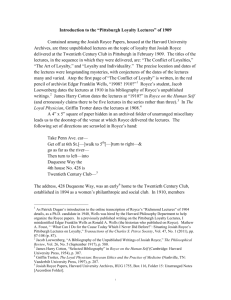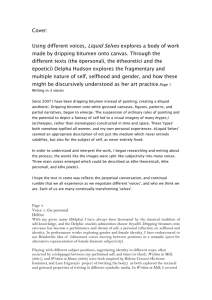Josiah Royce- From a Mining Community in Grass Valley to Harvard
advertisement
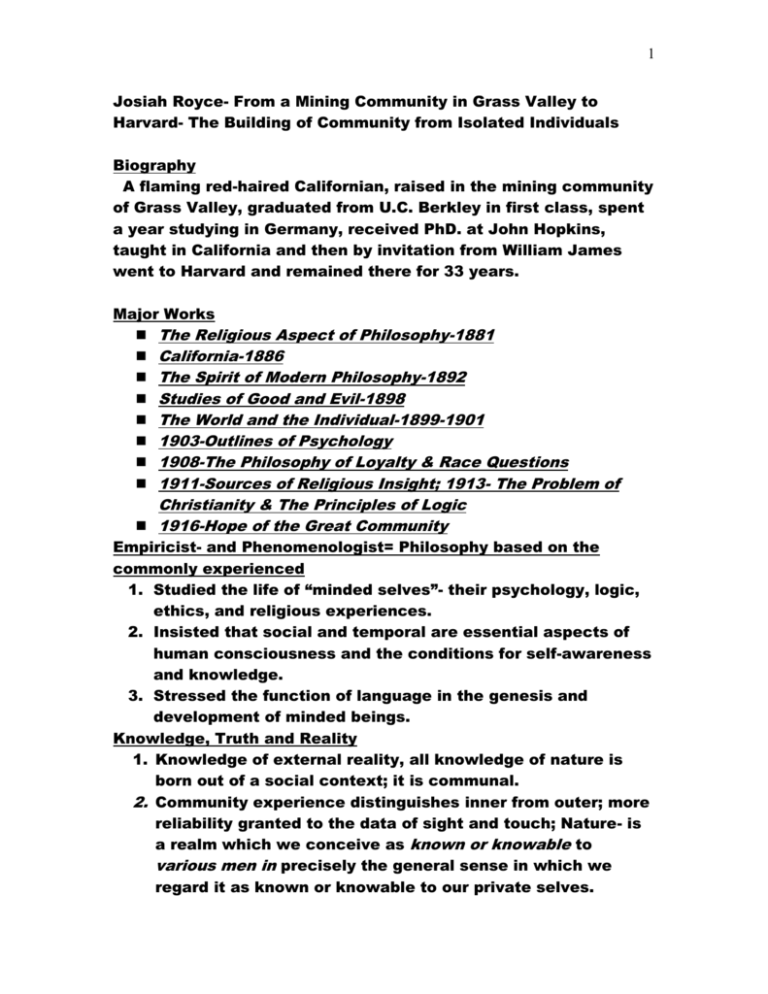
1 Josiah Royce- From a Mining Community in Grass Valley to Harvard- The Building of Community from Isolated Individuals Biography A flaming red-haired Californian, raised in the mining community of Grass Valley, graduated from U.C. Berkley in first class, spent a year studying in Germany, received PhD. at John Hopkins, taught in California and then by invitation from William James went to Harvard and remained there for 33 years. Major Works The Religious Aspect of Philosophy-1881 California-1886 The Spirit of Modern Philosophy-1892 Studies of Good and Evil-1898 The World and the Individual-1899-1901 1903-Outlines of Psychology 1908-The Philosophy of Loyalty & Race Questions 1911-Sources of Religious Insight; 1913- The Problem of Christianity & The Principles of Logic 1916-Hope of the Great Community Empiricist- and Phenomenologist= Philosophy based on the commonly experienced 1. Studied the life of “minded selves”- their psychology, logic, ethics, and religious experiences. 2. Insisted that social and temporal are essential aspects of human consciousness and the conditions for self-awareness and knowledge. 3. Stressed the function of language in the genesis and development of minded beings. Knowledge, Truth and Reality 1. Knowledge of external reality, all knowledge of nature is born out of a social context; it is communal. 2. Community experience distinguishes inner from outer; more reliability granted to the data of sight and touch; Nature- is a realm which we conceive as known or knowable to various men in precisely the general sense in which we regard it as known or knowable to our private selves. 2 3. Science is necessarily social and historical in nature- it is social needs of various kinds that guided the development of scientific knowledge, e.g. drive to quantify. 4. Data is “theory-ladened”- “We let facts speak but we also talk back.” We interpret as well as report. 5. However, there is in scientific knowledge both coercive “thereness” and “meanings freely created.” 6. Truth is both absolute and relative. Thought if constructive of reality, logic is instrumental and a logic of will. Thus, “relation” and “class” unite creation and discovery- they are found in empirical facts such as a particular relation between father and son, or in classification of physical objects. (These are conventional). But logical constants also are absolute. Such logical facts such as the difference between yes and no are not dependent on the contingent aspect of our sensations. Their necessity depends upon the fact that without them no rational action of any kind is possible. 7. Conceptual schemes have functional efficacy in unifying our knowledge and the search for truth is open-ended. Nevertheless necessary truths are to be found. Truth is useful but it is also true. 8. There are three kinds of knowledge which deal with three different kinds of things known- perception, conception, and interpretation. 9. There is continuity between nature and the human self. Unconscious and conscious nature shares the following four features: (1) irreversibility; (2) communication; (3) the formation of habits; and (4) evolutionary growth. “We have no right whatever to speak of really unconscious nature but only of uncommunicative nature. There is a difference in temporal and appreciative span. The Human Self and Individual 1. Anti-Cartesian- “Whatever the self is, it is not a thing, a substance.” It is a process having both a public, physical, behavioral aspect which is an empirical self, and a private inner aspect, the self as inner life, the series of states of consciousness, feelings, thoughts, desires, memories, 3 emotions, moods. The self is a totality of facts-public & private. 2. Human consciousness is intentional and purposive- selective attention is fully at work. Thus, the world is seen by me from a particular, often narrow point of view. This demands transcendence of self and checking things out with fellow selves. Objectivity is intersubjectivity. 3. The self is not known directly-only through interaction and interpretation. Self-reflection is interpretation of self to self. 4. A self is an expression of purpose- “By this meaning of my life plan…,I am defined and created a Self.” 5. Individuality and individuation is an ethical matterindividuals are “affective objects of interest,” “a beloved this and no other.” 6. The human self rises to moral life through a transformation out of a state of alienation from society or of an isolated individual into authentic loyalty of a genuine community. Community 1. For Royce genuine individuals cannot exist without genuine communities; individuals without genuine communities are empty; communities without genuine individuals are blind. 2. Community is an essential concept for Royce. In The Problem of Christianity he discusses the conditions for a genuine community. The first condition is the power of the individual to extend his life beyond self. Communication among selves that involves attentive listening to the ideas and hopes of others is the second condition of community. Interpretation, then, is the process that creates community. Achievement of unity is the third condition. 3. Royce fully recognizes the presence of evil and less than satisfactory communities. He develops the concept of loyalty to loyalty as the ultimate ethical principle. This principle posits the cause of universal loyalty-this is an authentic and resolute will to promote the building of more and more community and to promote the authentic moral growth of all individuals. 4
